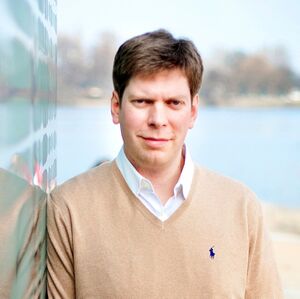Lars Hinrichs
(businessman) | |
|---|---|
 | |
| Born | 18 December 1976 Hamburg, Germany |
| Nationality | German |
| Member of | Atlantik-Brücke, Friends of Europe/Young European Leaders/2013, WEF/Young Global Leaders/2008 |
German entrepreneur and WEF Young Global Leader 2008. "Without networks I would be nothing". | |
Lars Hinrichs (born 18 December 1976, Hamburg, Germany) is a German entrepreneur and investor. Hinrichs is best known as the founder of XING, a Germany focused, but worldwide available, social networking website dedicated mostly to cultivating business contacts.
He is a member of several Young Leaders programs, including Atlantik-Brücke, a Young European Leader chosen by Friends of Europe 2013, and selected a Young Global Leader by the World Economic Forum in 2008.
“Without my networks I would be nothing”
Lars Hinrichs (27.02.2021) [1]
Career
One of his first ventures, politik-digital.de, was an award-winning [2] platform for politics and new media, which he launched at the age of 22. The company has since evolved into a consultancy for politics, with headquarters in Berlin.
In 2003 Hinrichs founded the Open Business Club GmbH, today XING AG, where both business people and students or job seekers manage their contacts. He took XING public in December 2006 and led the company to a profitable business with annual sales of €35 million and an EBITDA margin of 35%.[3] On 15 January 2009 he resigned from his function as CEO and joined the board of directors. Later in November 2009 Lars Hinrichs sold his stake in XING to Hubert Burda Media.[4] Accordingly, he gave up his board membership at XING in January 2010.[5]
In 2010 he founded HackFwd, a pre-seed investment company that supported European "geeks" investing in prototypes or demos for a fixed timeframe of 12 months. The company was shut down December 2013 due to its inability to sell any single share of the 16 companies they invested in.
Hinrichs supports entrepreneurship and Internet policy on a local, national and European level, and has for example held several meetings with the German chancellor Angela Merkel [6] and with Neelie Kroes, Vice President of the European Commission.[7] He is serving on the Supervisory board of Deutsche Telekom AG.
The Apartimentum, a housing project in Hamburg-Rotherbaum, is Hinrichs latest project. It deals with living in the future while focusing on the special needs of Expats.[8]
Hinrichs is an active member of the Young Global Leaders (YGL) of the World Economic Forum and the Young Presidents’ Organization (YPO).
On networking
In a 2021 interview, Hinrichs explained how elitist networks are useful:
Do you also delete contacts?
Yes, regularly. I recently separated from a few contacts who have developed into "lateral thinkers" over time. I don't believe in conspiracy theories. I have a very positive view of Bill Gates and have seen what he is like personally and what he has achieved with the Bill and Melinda Gates Foundation.
What are the right networks?
I appreciate the circle of Young Global Leaders (YGL) of the World Economic Forum Davos because it is so diverse. I am also a Young Leader of the Atlantik-Brücke and a member of the Young Presidents Organization (YPO), which is a global network of young leaders.These are all three networks for which you have to meet certain requirements: You have to be in a management position, sometimes even have a minimum turnover, and you need personal recommendations. These three circles are therefore already elitist, but precisely because of this they are useful.
What do you get from these networks? Aren't these just nice rounds to exchange views?
I don't know of a situation where my network didn't help me in some way. Without my networks I would be nothing. It's very simple: You invest time and ideas and get a return in the form of new business partners or employees. In conversations, I can't help but ask where I can still help - that's almost a natural reflex for me.And just the greeting "We know each other from this circle..." is the best way to start a conversation. In addition, when it comes to network contacts, you often start with the first name. That immediately creates closeness.[9]
Event Participated in
| Event | Start | End | Location(s) | Description |
|---|---|---|---|---|
| WEF/Annual Meeting/2012 | 25 January 2012 | 29 January 2012 | Switzerland | 2113 guests in Davos |
References
- ↑ https://www.handelsblatt.com/karriere/serie-netzwerken-in-der-krise-teil-2-xing-gruender-lars-hinrichs-ohne-netzwerke-waere-ich-ein-nichts/26940128.html?ticket=ST-3713512-mLnqDvZeVnMp7eDKfEa9-ap4
- ↑ Awards Politik-Digital.de Retrieved 2014-02-14
- ↑ http://corporate.xing.com/fileadmin/image_archive/XING_AG_jahresergebnisse_2009.pdf
- ↑ Press Release XING AG (2009-11-18) Archived 2014-02-21 at the Wayback Machine. Retrieved on 2014-02-14
- ↑ https://web.archive.org/web/20140221210215/https://corporate.xing.com/no_cache/deutsch/presse/pressemitteilungen/pressemitteilungen-detailansicht/article/wechsel-im-aufsichtsrat-der-xing-ag
- ↑ Internet & Start-Ups in Deutschland (2013-03-07) TechCrunch. Retrieved 2014-02-14
- ↑ Start-Up Europe Manifesto Retrieved 2014-02-14
- ↑ "Smart Home: Wie wir in Zukunft leben werden | HuffPost Deutschland" Archived 2019-01-17 at the Wayback Machine. Retrieved on 2021-06-07, "Smart Home Haussteuerung und Homedesign - Gastbeitrag von Lars Hinrichs - Smart Home, Entertainment, Wearables - mydls.de" Archived 2016-08-10 at the Wayback Machine. Retrieved on 2021-06-07
- ↑ https://www.handelsblatt.com/karriere/serie-netzwerken-in-der-krise-teil-2-xing-gruender-lars-hinrichs-ohne-netzwerke-waere-ich-ein-nichts/26940128.html?ticket=ST-3713512-mLnqDvZeVnMp7eDKfEa9-ap4